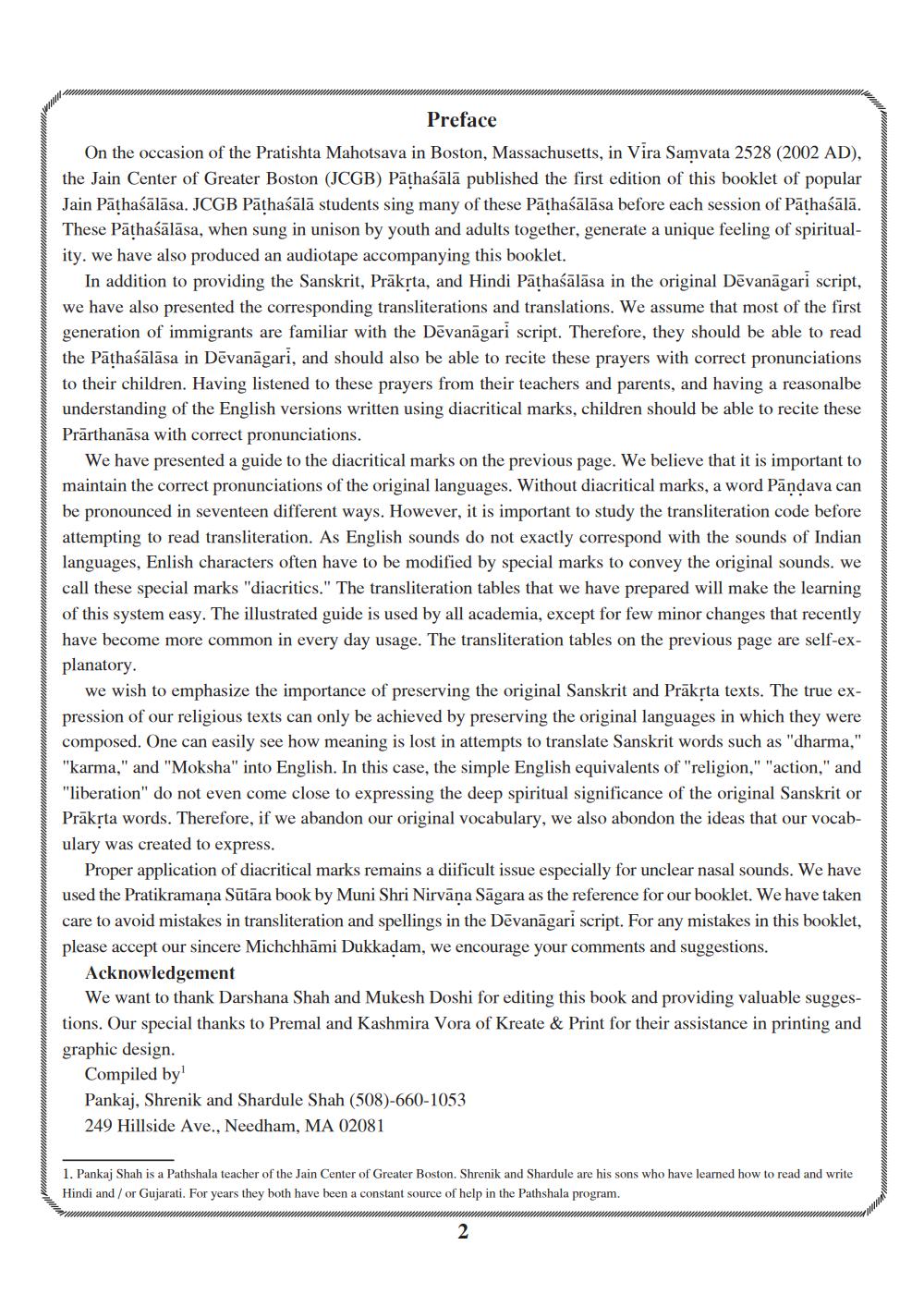Book Title: Jain Prarthanas Author(s): Jain Center of Greater Boston Publisher: Jain Center of Greater Boston View full book textPage 5
________________ Preface On the occasion of the Pratishta Mahotsava in Boston, Massachusetts, in Vira Samvata 2528 (2002 AD), the Jain Center of Greater Boston (JCGB) Pāthaśālā published the first edition of this booklet of popular Jain Pathaśālāsa. JCGB Pathaśālā students sing many of these Pathaśālāsa before each session of Pathaśālā. These Pathaśālāsa, when sung in unison by youth and adults together, generate a unique feeling of spirituality. we have also produced an audiotape accompanying this booklet. In addition to providing the Sanskrit, Prāksta, and Hindi Pathaśālāsa in the original Dēvanagari script, we have also presented the corresponding transliterations and translations. We assume that most of the first generation of immigrants are familiar with the Devanagari script. Therefore, they should be able to read the Pāthaśālāsa in Dēvanāgari, and should also be able to recite these prayers with correct pronunciations to their children. Having listened to these prayers from their teachers and parents, and having a reasonalbe understanding of the English versions written using diacritical marks, children should be able to recite these Prārthanāsa with correct pronunciations. We have presented a guide to the diacritical marks on the previous page. We believe that it is important to maintain the correct pronunciations of the original languages. Without diacritical marks, a word Pandava can be pronounced in seventeen different ways. However, it is important to study the transliteration code before attempting to read transliteration. As English sounds do not exactly correspond with the sounds of Indian languages, Enlish characters often have to be modified by special marks to convey the original sounds, we call these special marks "diacritics." The transliteration tables that we have prepared will make the learning of this system easy. The illustrated guide is used by all academia, except for few minor changes that recently have become more common in every day usage. The transliteration tables on the previous page are self-explanatory. we wish to emphasize the importance of preserving the original Sanskrit and Prāksta texts. The true expression of our religious texts can only be achieved by preserving the original languages in which they were composed. One can easily see how meaning is lost in attempts to translate Sanskrit words such as "dharma," "karma," and "Moksha" into English. In this case, the simple English equivalents of "religion," "action," and "liberation" do not even come close to expressing the deep spiritual significance of the original Sanskrit or Prakrta words. Therefore, if we abandon our original vocabulary, we also abondon the ideas that our vocabulary was created to express. Proper application of diacritical marks remains a diificult issue especially for unclear nasal sounds. We have used the Pratikramana Sūtāra book by Muni Shri Nirvana Sāgara as the reference for our booklet. We have taken care to avoid mistakes in transliteration and spellings in the Dēvanāgari script. For any mistakes in this booklet, please accept our sincere Michchhāmi Dukkadam, we encourage your comments and suggestions. Acknowledgement We want to thank Darshana Shah and Mukesh Doshi for editing this book and providing valuable suggestions. Our special thanks to Premal and Kashmira Vora of Kreate & Print for their assistance in printing and graphic design. Compiled by Pankaj, Shrenik and Shardule Shah (508)-660-1053 249 Hillside Ave., Needham, MA 02081 1. Pankaj Shah is a Pathshala teacher of the Jain Center of Greater Boston. Shrenik and Shardule are his sons who have learned how to read and write Hindi and / or Gujarati. For years they both have been a constant source of help in the Pathshala program. wesente WWWWWWMMMMMMMMMMMMMMMMMMMMMM m entePage Navigation
1 ... 3 4 5 6 7 8 9 10 11 12 13 14 15 16 17 18 19 20 21 22 23 24
